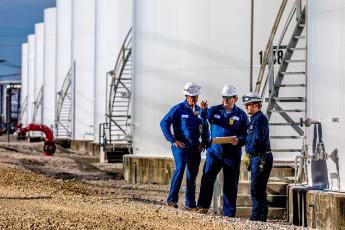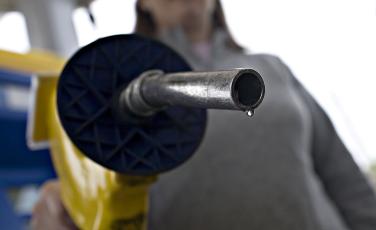AFPM statement on EPA’s decision to grant Midwest petitions to eliminate RVP waiver for summertime gasoline
AFPM Senior Director of Fuels & Vehicle Policy Patrick Kelly today issued the following statement on EPA's announcement that it will grant requests from eight Midwestern states to remove the 1.0 psi RVP waiver from summertime gasoline effective next year. If implemented, these states will no longer be able to sell the current blend of summertime gasoline and a new grade of gasoline will need to be manufactured and supplied to the region.
AFPM’s Chet Thompson on the Labor & Energy Show
AFPM President & CEO Chet Thompson was a guest on a recent broadcast of “The Labor & Energy Show”, which airs up and down the Mid-Atlantic
Transporting fuels and chemicals by rail: What AFPM members do to keep rail shipments safe
Transportation safety is a shared responsibility and a range of stakeholders play a part, including rail shippers, rail workers, the railroads (or rail carriers) and well-prepared emergency responders. AFPM members, as shippers, control the tank cars and rail cars we own up to the point when we hand them over to the railroads.
RVP “opt-out” = $500-$800-million summertime “tax” on Midwest fuel supply chain & consumers
Eight midwestern governors have petitioned the EPA seeking to opt their states out of the federal 1-pound Reid Vapor Pressure (RVP) waiver which is a requirement to sell the current summertime blend of E10 gasoline. If these requests are granted, the E10 gasoline currently sold in most of the country during summer months will no longer be offered for sale in these states and annual costs to introduce a new gasoline bend will range from $500-$800 million each year.
AFPM responds to President Biden’s State of the Union comments on refinery earnings, investments
AFPM President and CEO Chet Thompson issued the following statement in response to President Biden’s State of the Union address: "Using the State of the Union to politicize market fundamentals and single out stock “buy back” programs—while overlooking the fact that the Biden administration’s own policies discourage the reinvestment of earnings back into the U.S. liquid fuel supply chain—cheapens the dialog for everyone."
Time for a revisit: What happens with refinery profits… and are “buy backs” a bad thing?
Publicly owned companies, like many U.S. refineries, have a fiduciary responsibility (which is a legal obligation) to act in the best interest of their shareholders, and that extends to how companies spend their earnings. Often, earnings are spent on a combination of the following: direct dividends, stock buy back programs, paying down debt and capital investment projects.
AFPM welcomes Aaron Ringel as Vice President of Government Relations
American Fuel & Petrochemical Manufacturers (AFPM) President & CEO Chet Thompson today issued the following statement on the recent hiring of Aaron Ringel as Vice President of Government Relations: “We are glad to welcome Aaron and immediately put him to work on behalf of AFPM’s members from the refining, petrochemical and midstream energy industries..."
AFPM to House Transportation & Infrastructure Committee: Don’t forget freight rail customers
AFPM President and CEO Chet Thompson this week submitted comments to leaders of the House Transportation & Infrastructure Committee after the Committee’s inaugural hearing on the state of U.S. transportation infrastructure and supply chains failed to include customer perspectives.
Mechanical and advanced recycling technologies — what’s the difference?
Moving the needle on plastic waste is no small feat, but petrochemical manufacturers are revolutionizing what’s possible. Advanced recycling technologies utilize advanced processes that break plastic waste all the way down to its original chemical components - expanding the types of plastics that can be recycled, and creating a higher-quality feedstock.









